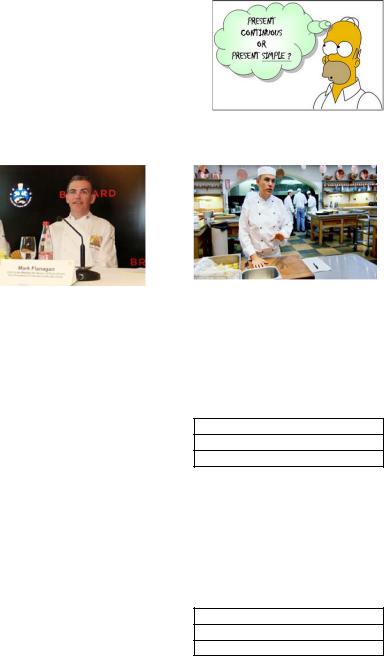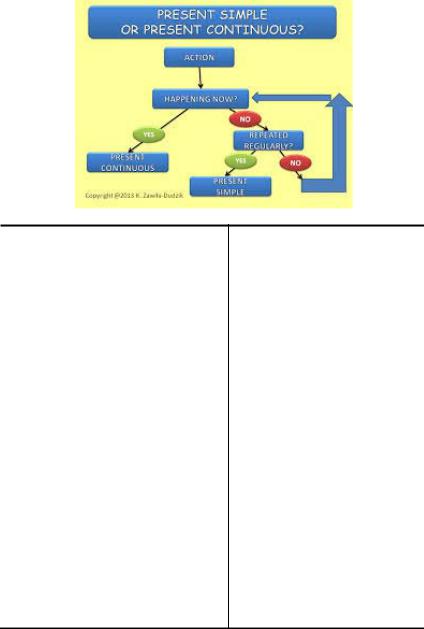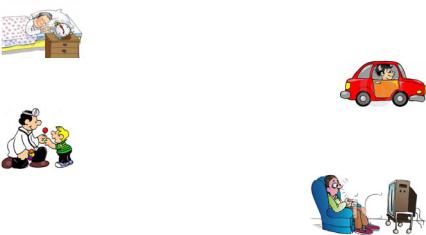
English Grammar in Context
.pdf
Министерство образования и науки Российской Федерации
Федеральное государственное бюджетное образовательное учреждение высшего профессионального образования
«Тамбовский государственный технический университет»
Е. Ю. Воякина, Н. А. Гунина, Л. Ю. Королева
ГРАММАТИКА АНГЛИЙСКОГО ЯЗЫКА
ПОДГОТОВКА К ИТОГОВОЙ АТТЕСТАЦИИ
Утверждено Учёным советом университета в качестве учебного пособия
для бакалавров, специалистов и магистрантов всех направлений и специальностей
Учебное электронное издание комплексного распространения
Тамбов Издательство ФГБОУ ВПО «ТГТУ»
2015
1
УДК 811.111 ББК 81.432.1 В79
Рецензенты:
Доктор филологических наук, профессор кафедры «Иностранные языки» ФГБОУ ВПО «ТГТУ»
Н. Ю. Бородулина
Кандидат филологических наук, доцент кафедры ЛОБП ФГБОУ ВПО «ТГУ им. Г. Р. Державина»
С. А. Лычаная
Воякина, Е. Ю.
В79 Грамматика английского языка. Подготовка к итоговой аттестации [Электронный ресурс] : практикум для бакалавров, специалистов и магистрантов всех направлений и специальностей / Е. Ю. Воякина, Н. А. Гунина, Л. Ю. Королева. – Тамбов : Изд-во ФГБОУ ВПО «ТГТУ», 2015. – 1 электрон. опт. диск (CD-ROM). – Системные требования : ПК не ниже класса Pentium II ; CD-ROM-дисковод
00,0 Mb RAM ; Windows 95/98/XP ; мышь. – Загл. с экрана. ISBN 978-5-8265-1396-5.
Состоит из 13 учебных блоков, включающих грамматические разделы, снабженные как справочным, так и практическим материалом, нацеленным на формирование и закрепление основных умений и навыков, необходимых для прохождения итоговой аттестации по английскому языку. Каждый раздел содержит несколько подразделов, охватывающих различные грамматические аспекты английского языка.
Предназначен для бакалавров, специалистов и магистрантов всех направлений и специальностей.
УДК 811.111 ББК 81.432.1
Все права на размножение и распространение в любой форме остаются за разработчиком. Нелегальное копирование и использование данного продукта запрещено.
ISBN 978-5-8265-1396-5 |
© Федеральное государственное бюджетное |
|
образовательное учреждение |
|
высшего профессионального образования |
|
«Тамбовский государственный технический |
|
университет» (ФГБОУ ВПО «ТГТУ»), 2015 |
2
CONTENTS
INTRODUCTION ………………………………………………………… 4
Unit 1. PRESENT SIMPLE VS. PRESENT CONTINUOUS ………….. 5
Unit 2. PRESENT PERFECT VS. PRESENT PERFECT
CONTINUOUS …………………………………………………... 11
Unit 3. PAST SIMPLE VS. USED TO …………………………………... 18
Unit 4. PAST CONTINUOUS / PAST PERFECT / PAST PERFECT CONTINUOUS …………………………………………………... 24
Unit 5. FUTURE FORMS ………………………………………………... 29
Unit 6. PASSIVE VOICE (1) ……………………………………………... 37
Unit 7. PASSIVE VOICE (2) ……………………………………………... 44
Unit 8. MODALS (3) ……………………………………………………… 51
Unit 9. MODALS (2) ……………………………………………………… 56
Unit 10. CONDITIONALS ……………………………………………….. 62
Unit 11. REPORTED SPEECH …………………………………………... 70
Unit 12. NOUNS AND ARTICLES ………………………………………. 76
Unit 13. ADJECTIVES AND ADVERBS ………………………………... 84
CONCLUSION ……………………………………………………………. 94
REFERENCES ……………………………………………………………. 95
3
INTRODUCTION
Данный практикум предназначен для бакалавров, специалистов и магистрантов всех специальностей и направлений технических вузов, изучающих английский язык на уровне Intermediate, для практического использования в бытовой сфере и профессиональной деятельности.
Цели практикума:
1)формирование у студентов навыков использования грамматики английского языка в бытовых ситуациях, профессиональном общении и межкультурной коммуникации;
2)обучение культуре иноязычного устного и письменного общения;
3)развитие общей, лингвистической и коммуникативной компетенций. Практикум направлен на решение следующих задач:
−обеспечить закрепление и активизацию грамматического материала, представленного в соответствующих разделах;
−развить умения и навыки говорения на основе пройденного грамматического материала;
−закрепить навыки письменной речи;
−подготовить к итоговой аттестации.
Данные цели и задачи определяют структуру практикума, который состоит из 13 учебных блоков. Каждая часть включает в себя теоретическую часть с объяснением основных правил грамматики и упражнения для их закрепления и использования в различных видах коммуникативной деятельности (чтении, говорении и письме).
Идея и разработка данного издания принадлежит Н. А. Гуниной
(Units 1 – 5), Е. Ю. Воякиной (Units 6 – 9), Л. Ю. Королевой (Units 10 – 13).
4

U n i t 1
PRESENT SIMPLE
VS. PRESENT CONTINUOUS
Present Simple |
Present Continuous |
Mark Flanagan is a Royal chef.
He cooks meals for Her Majesty Queen Elizabeth II.
But at the moment he isn’t cooking. He’s giving a speech.
(+)
I / we/ you / they |
|
drive /go / work |
||
He / she / it |
|
drives / goes/ works |
||
(?) |
|
|
|
|
|
|
|
|
|
Do |
I / we/ you / they |
Drive / go / |
||
Does |
he / she / it |
work? |
||
(–) |
|
|
|
|
|
|
|
||
I / we/ you / they |
don’t |
drive / go / |
||
He / she / it |
doesn’t |
work |
||
Now Mark is in the kitchen. He’s cooking.
This means: He is cooking now, at the time of speaking, the action is not finished.
(+)
I’m cooking.
He’s/she’s/it’s working
We’re/you’re/they’re playing
(?)
Am |
I |
working? |
Is |
He / she / it |
cooking? |
Are |
We / you / they |
playing? |
(–)
I’m not cooking
He/she/it isn’t working
We/you/they aren’t playing
5

How to use Present Simple and Present Continuous
We use Present Simple if:
1) things happen repeatedly
What do they usually read at weekends?
Jane does her homework every day. 2) things happen in general
Most people learn to swim when they are children.
3) the action is a scientific fact
Every day the population of the world increases by 200,000 people.
4) the situation is permanent
You work hard most of the time.
I’m living with my friends until I find
aplace of my own.
5)the situation happens according to the programme or timetable
The film begins at 4.30.
We use Present continuous for:
1)actions happening at the time of speaking:
Please don’t switch on the TV. I’m reading.
2)actions not necessarily happening at the time of speaking.
I’m learning to swim. My father is teaching me.
3)changing or developing situations (to show the dynamics)
The population of the world is increasing very fast.
4)temporary situations
You’re working hard today.
5)fixed arrangements in the near future
I’m flying to London next Monday.
6)situations to express annoyance or criticism (with always)
She is always complaining.
6

Time expressions
Always, usually, often, sometimes, hardly ever, occasionally, from time to time, seldom, rarely, never.
He often goes to the theatre. (adverb is placed before the main verb)
He is often late. (adverb is placed after the verb to be)
Every day / week / month / year once a year/ twice a week / three times a day
Now, at the moment, at present, currently, these days
I’m working hard these days.
Tonight, tomorrow, next week / month / Monday
I’m going to the cinema tonight.
Non-continuous Verbs
Mental and |
believe, dislike, |
Examples |
|
|
Emotional States |
doubt, imagine, |
She dislikes that boy. NOT She |
||
|
know, like, love, |
is disliking that boy. Jack prefers |
||
|
hate, prefer, realize, |
going out for dinner tonight. |
||
|
recognize, |
NOT Jack is preferring going out |
||
|
remember, suppose, |
for dinner tonight. I recognize |
||
|
understand, want, |
you! NOT I'm recognizing you! |
||
|
wish |
|
|
|
Sense |
appear, hear, see, |
Examples |
|
|
|
seem, smell, sound, |
It tastes strange. NOT It is tasting |
||
|
taste |
strange. Do you hear that? |
||
|
|
NOT Are you hearing that? |
|
|
Communication |
agree, astonish, |
Examples |
|
|
|
deny, disagree, |
You astonish me! NOT You are |
||
|
impress, mean, |
astonishing |
me! I'm |
afraid |
|
please, promise, |
I disagree with you. NOT I'm |
||
|
satisfy, surprise |
afraid I am disagreeing with you. |
||
Other States |
be, belong, |
Examples |
|
|
|
concern, consist, |
It depends on how much it costs. |
||
|
contain, cost, |
NOT It is depending on how |
||
|
depend, deserve, |
much it is |
costing. She |
said |
|
fit, include, |
it involved a lot of work. NOT |
||
|
involve, lack, |
She said it was involving a lot |
||
|
matter, need, owe, |
of work. It doesn't matter. NOT It |
||
|
own, possess |
isn't mattering. |
|
|
7

There are also a number of verbs that don't take the continuous forms in one meaning but DO take the continuous forms in other meanings. Here are some of the most important:
|
Non-Continuous Meanings |
Continuous Meanings |
|||
|
|
|
|||
feel = 'have an opinion' |
|
feel = 'feel physically' |
|||
He feels he should get a second |
I'm feeling awful this afternoon. |
||||
chance. |
|
|
|
|
|
see = 'understand' |
|
|
see = 'visit' |
||
I see what you mean. |
|
She's seeing a doctor this morning. |
|||
think = 'have an opinion' |
|
think = 'use the brain' |
|||
I |
think |
we |
should |
leave |
He's thinking hard about the problem. |
immediately! |
|
|
|
|
|
appear = 'look like' |
|
|
appear = 'be on stage / perform' |
||
That appears to be stale. |
|
Jack Daniels is appearing at the |
|||
|
|
|
|
|
Paramount tonight. |
look = 'seem' |
|
|
|
look = 'stare at' |
|
It looks impossible! |
|
|
I'm looking at that strange man. |
||
taste = 'have a taste' |
|
|
taste = 'use the mouth' |
||
That tastes yummy |
|
|
The cook is tasting the sauce! |
||
be = ‘auxiliary verb’ |
|
Be = behave, act |
|||
She is a nurse |
|
|
She’s being rude these days (It means |
||
|
|
|
|
|
she is behaving rude at the moment) |
Let’s Practice
1. Read the paragraph and answer the questions:
Brian is a doctor. He looks after sick people. He usually gets up at 6.00 o’clock. Today he is late, it is 6.30 and he is still in bed.
He usually goes to work by train but today he is driving to work. He arrives at work at 6.30 every morning but it is 7.30 now and he is still driving.
It’s 12.00 o’clock now. He always has his lunch at 12.00 but today he isn’t having lunch at 12.00, he is looking after his sick patients.
It is half past seven now, Brian is watching TV. He usually watches TV at half past seven because his favourite programme starts at half past seven. Brian has his dinner at 8.30 everyday and he is having dinner now.
8
It is 12 pm now Brian is going to bed. He always goes to bed at midnight.
1.What does Brian do?
2.What time does he usually get up?
3.How does he usually go to work?
4.Why is he driving to work today?
5.What time does he arrive at work every day?
6.When does he always have his lunch?
7.What is he doing at 12.00 today?
8.Why does he usually watch TV at 7.30?
9.What time does he go to bed?
10.What time is he going to bed now?
2. Some people complain about complexities of normal life. They think that their life isn’t exciting enough. Talk about your daily routine. Do you live an action-packed life?
Use the following verbs: wake up, get up, take a shower, get dressed, make breakfast, have breakfast, leave home, take a bus, drive, have classes, have lunch, go home, get home, watch TV, do homework, read books, surf the Internet, go out with friends, do some housework, go to bed, etc.
Remember to add the appropriate time expressions: in the morning, at noon, after lunch, before midnight, at 3 pm, etc.
3.Complete the sentences with the present simple or present continuous form of the verbs in brackets.
1.She ________ (run) because she's late for her lesson.
2.Our teacher always _______ (give) us lots of homework.
3.We _______ (not want) to go to the concert.
4.What time ________ (you / meet) Pete tomorrow?
5.I _________ (not work) today. I'm on holiday.
6.People ________ (speak) English in Jamaica.
4. Make questions to the answers about ALAN.
Questions:
1.What ________________ ?
2.How old ______________ ?
3.How many ____________ ?
4.What time ____________ ?
5.What _________ for breakfast?
6.What _________ ?
7.What _________ after breakfast?
ALAN
1.Alan’s a lorry driver.
2.He’s twenty-five years old.
3.He works five days a week.
4.He gets up at six o’clock every day.
5.He eats an enormous breakfast.
6.He drinks two cups of tea.
7.Then he kisses his wife.
9

5.Ask questions for the underlined words:
1.George often has a bath.
2.Mike eats corn-flakes for breakfast every morning.
3.The teacher is writing some examples on the board.
4.Tom is watching a film now.
5.My parents never smoke cigarettes.
6.Peter and Rob go to school by service bus.
6. Put the verb in brackets in the correct form (present simple or present continuous).
Next week, my friends and I _______ (go) camping in the woods. I _________ (organize) the food, because I ________ (like) cooking. Dave ________ (have) a big car with a trailer, so he _________ (plan) the transportation. Sam _______ (bring) the tent – he ______ (go) camping every year, so he _______ (have)
a great tent and lots of other equipment. My wife ________ (think) we're crazy.
She _______ |
(like) holidays in comfortable hotels, so she __________ (take) a |
trip to Paris instead. |
|
7. Complete the dialogue: |
|
Jane: |
Excuse me, ___________ you speak English? |
Franck: |
Yes, I _______________ . |
Jane: |
Where _______________ the museum of art? |
Franck: |
Sorry, I ______________ know. |
Jane: |
___________ you American? |
Franck: |
No, I ___________ not. I _________ in Europe. |
|
I ___________ a tourist, like you! |
8.Role-play the conversation in 7.
9.Talk to as many people in the class to find a person who shares similar interests with you.
Use the following ideas to ask questions.
A person who:
likes eating pasta for dinner
enjoys watching horror films / thrillers / comedies / soap operas doesn’t mind sleeping in a tent / doing the dishes
hates spiders / snakes / mice / babies
takes a shower in the morning / in the evening
10
